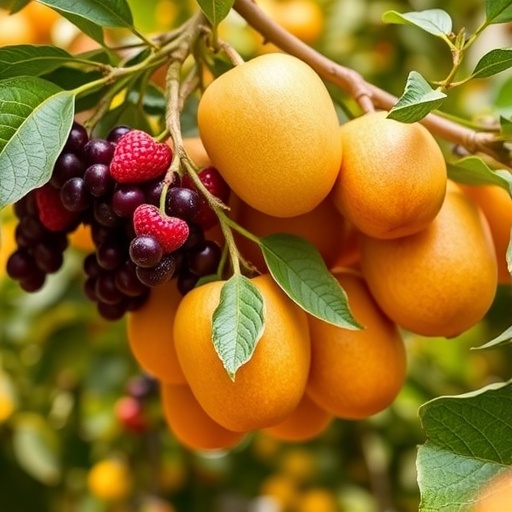In a groundbreaking study that spans three crucial years of research, a recent paper highlights the pressing issue of pesticide residues in fruits sold across various markets in Riyadh, Saudi Arabia. This pivotal research, conducted by a team of experts led by Ar Reshaid, delves deep into the prevalence, types, and potential health risks of pesticide residues found in the region’s agricultural produce. The findings pose significant implications not only for public health but for regulatory practices regarding pesticide usage in fruit cultivation.
The study methodically evaluated a broad array of fruits sourced from local markets, analyzing samples for pesticide residue levels. The researchers aimed to paint a comprehensive picture of the state of pesticide contamination in Riyadh’s fruits and provide actionable data that could influence policy and consumer awareness. Notably, the rigorous three-year approach allowed the team to track changes over time, offering insights into the effectiveness of existing regulations and the evolving practices among local farmers.
One of the most striking findings of the study was the sheer volume of pesticide residues detected. The researchers reported that a significant proportion of the fruit samples collected from the markets contained residue levels that exceed the safety thresholds established by international guidelines. This shocking revelation raises alarms about the potential health risks posed to consumers, particularly given the growing concerns around chronic exposure to certain pesticides linked to long-term health issues.
Within the study, fruits such as apples, oranges, and strawberries were among the most frequently tested. The data revealed that multiple pesticide types were found in single fruit samples, indicating that fruit from local markets frequently carries a cocktail of chemicals. This multi-residue presence poses a unique challenge for both health assessments and regulatory responses, as it complicates the determination of which specific residues pose the greatest risk.
The researchers further highlighted the inefficacy of current regulatory measures in curbing pesticide levels within local agriculture. There is a perception that regulatory bodies may not be enforcing strict enough controls on pesticide usage, which can jeopardize consumer safety. This issue of enforcement is compounded by a lack of transparency in reporting pesticide applications by farmers and market vendors, leading to significant gaps in the safety net that is supposed to protect public health.
Moreover, the study emphasized the importance of consumer education regarding pesticide residues. As awareness surrounding food safety rises globally, the Riyadh markets have an obligation to inform consumers about the potential risks associated with consuming fruits that may carry harmful pesticide residues. Enhancing transparency regarding pesticide usage and offering clearer information about safe consumption levels can empower consumers to make informed choices about their diets.
To further compound the situation, the study also looked into the agricultural practices employed by local farmers. Many of these practices, while traditional, often rely heavily on the application of chemical pesticides to maximize yield and minimize losses from pests. The researchers argued that transitioning towards integrated pest management and organic farming practices could substantially reduce pesticide reliance while ensuring fruit quality and safety.
The persistence of pesticide residues in fruits not only affects public health but also tarnishes the reputation of local produce. As global markets shift toward organic and sustainable practices, Riyadh’s farmers may face difficulties in exporting their fruits due to stringent international standards concerning pesticide residues. Consequently, there is a pressing need for immediate strategies to improve the safety of produce in local markets, not just for local consumption but for global trade as well.
The research concludes with a compelling call to action. It urges policymakers to reevaluate existing pesticide regulations and implement stricter controls to ensure that agricultural practices do not compromise consumer safety. Moreover, the study highlights the necessity for collaboration between government bodies, farmers, and market vendors to foster a culture of transparency and responsibility regarding pesticide usage.
In essence, the findings from this extensive evaluation illuminate a critical public health issue that transcends borders. The study serves as an urgent reminder that without concerted efforts to address pesticide residues, consumers in Riyadh and beyond could be at risk. The implications stretch far into the realm of sustainability, agricultural practices, and global food safety, necessitating this dialogue be opened and maintained for the benefit of public health.
In conclusion, the study sheds light on an issue that must be addressed urgently. The insights gleaned not only inform us about the current state of pesticide residues in fruits but also pave the way for future research and public discourse around agricultural practices, consumer safety, and regulatory measures aimed at protecting public health in Riyadh and similar markets.
As the public becomes more educated about these concerns, the future of fruit consumption may hinge on the ability of markets, farmers, and regulators to adapt and prioritize safety above all else. This study stands as a vital contribution to ensuring that fruits from Riyadh markets can be enjoyed safely and healthily, reinforcing the essential connection between agriculture, health, and well-being.
Subject of Research: Pesticide residues in fruits from Riyadh markets
Article Title: Pesticide residues in fruits from Riyadh markets: a three-year evaluation.
Article References:
Ar Reshaid, A., Alshemaimri, D., Khabbouchi, M. et al. Pesticide residues in fruits from Riyadh markets: a three-year evaluation.
Environ Monit Assess 197, 1253 (2025). https://doi.org/10.1007/s10661-025-14678-z
Image Credits: AI Generated
DOI:
Keywords: Pesticide residues, Riyadh markets, fruit safety, public health, agricultural practices.




